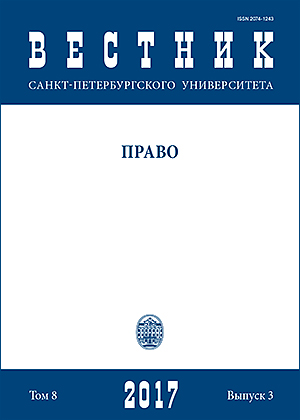Differentiation of criminal liability for fraud in the sphere of an entrepreneurial activity: the review of Russian approaches against the background of a scarcity of international legal regulation
DOI:
https://doi.org/10.21638/11701/spbu14.2017.309Abstract
This scientific review concerns provisions of international legal acts and national approaches of such states as Austria, Brazil, Spain, Italy, Kazakhstan, The People’s Republic of China, the Netherlands, the United Kingdom, the USA, France and Switzerland of criminal liability for fraud in the sphere of an entrepreneurial activity. The appeal of the author to this question is explained by the discussions related to the further development of criminal legislation on the matter going in Russia: As the resolution of the Constitutional Court of the Russian Federation of December 11, 2014 No. 32-P of provisions of article 1594 UK of the Russian Federation were recognized as unconstitutional, and the Federal law of 03.07.2016 No. 323-FZ article 159 UK of the Russian Federation is added with three new parts establishing criminal liability for fraud resulting from deliberate non-execution of contractual obligations in the sphere of entrepreneurial activity. The author shows in the review the main (conceptual) approaches the states adopt to establish criminal liability for fraud in the sphere of entrepreneurial activity by means of allocation of general and special structures of these acts employing as a basis the categories of Russian penal law. A special actus reus is formulated by proceeding from two criteria: (1) the qualitative, caused by non-execution of contractual obligations in the sphere of an entrepreneurial activity and (2) formal, connected with presence at the person of the status of the subject of an entrepreneurial activity irrespectively executions of contractual obligations by it. Also the author studied sanctions for data, a crime which in general is similar to sanctions for general or other special structures of fraud, and the most widespread qualifying signs of special structures of the crime considered. Refs 11.
Keywords:
penal law, criminal responsibility, fraud, entrepreneurial activity, business, subject of a crime, actus reus, sanction
Downloads
References
References
Downloads
Published
How to Cite
Issue
Section
License
Articles of "Vestnik of Saint Petersburg University. Law" are open access distributed under the terms of the License Agreement with Saint Petersburg State University, which permits to the authors unrestricted distribution and self-archiving free of charge.






